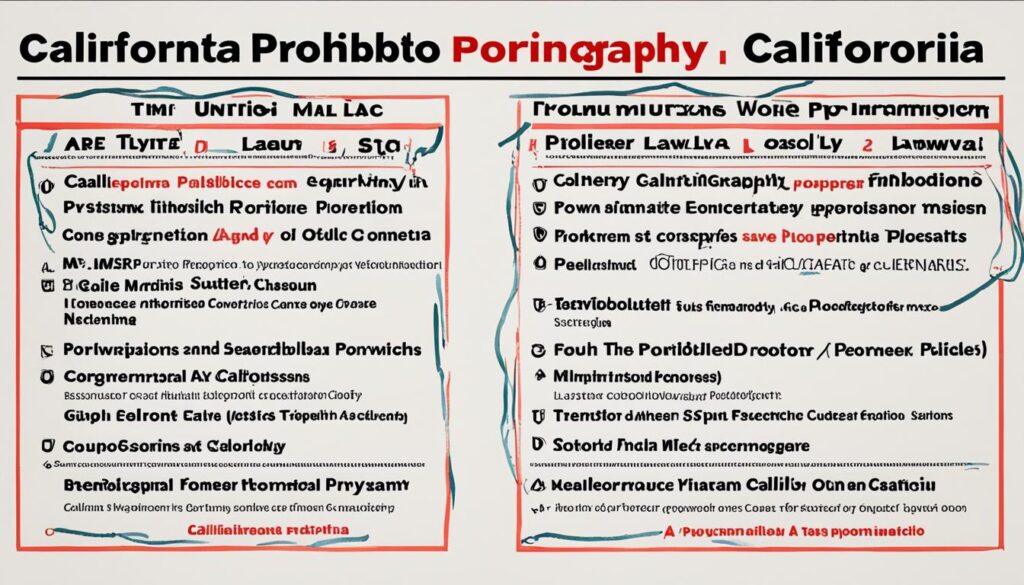California Pornography Laws: What You Need to Know

California has specific laws for pornography production, distribution, and exhibition. These laws are crucial for individuals and businesses in the adult entertainment industry. Breaking these rules can lead to serious legal trouble.
This guide covers key aspects of California’s pornography laws. It explains obscenity definitions, age verification, and consent requirements. The guide also addresses online pornography and First Amendment considerations.
Key Takeaways
- California Penal Code 311 criminalizes various actions related to child pornography, including sharing, possessing, or creating such material.
- California obscenity laws rely on the Miller Test to determine if material is obscene, considering community standards and the lacking of serious value.
- California imposes strict age verification procedures for individuals depicted in pornography to ensure they are of legal age.
- Adult performers in California must give voluntary and informed consent before engaging in explicit acts and must be of legal age.
- Distributing obscene material to minors in California is prohibited under Penal Code Section 313.1, with legal consequences for offenders.
Defining Pornography and Obscenity in California
California law distinguishes between pornography and obscenity. Pornography refers to sexually explicit material meant to arouse. Obscenity, a legal term, is defined by state and federal laws.
What is Considered Pornography in California?
In California, pornography is sexually explicit material designed to provoke arousal. It can include visual, written, or audio content featuring nudity or sexual acts.
What is Considered an Obscenity in California?
California defines obscenity using the Miller test. It’s material that appeals to prurient interest and depicts sexual conduct offensively. It also lacks serious literary, artistic, political, or scientific value.
Criteria for Determining Obscenity
The Miller test, from the U.S. Supreme Court case Miller v. California, sets criteria for obscenity. It considers three main factors:
- Whether the average person, applying contemporary community standards, would find that the work, taken as a whole, appeals to the prurient interest.
- Whether the work depicts or describes, in a patently offensive way, sexual conduct specifically defined by the applicable state law.
- Whether the work, taken as a whole, lacks serious literary, artistic, political, or scientific value.
Applying the Miller test can be tricky in the digital age. Community standards vary across different regions and online platforms.
Age Verification and Consent Requirements
California has strict laws to protect minors from exploitation in pornography production. The state’s Penal Code Section 311 bans creating, distributing, and possessing explicit materials with underage individuals. To comply, the law requires thorough age verification for all performers.
This includes obtaining and maintaining valid identification records. Regular checks are also mandatory to ensure ongoing compliance.
Age Verification and Minors
California strongly opposes involving minors in adult entertainment. Producers and distributors must follow strict age verification rules. This helps prevent the exploitation of children and teens.
Failing to comply can lead to harsh civil and criminal penalties. The government takes these regulations very seriously.
Requirements for Age Verification
- Performers must provide valid government-issued identification to verify their age before engaging in any explicit activities.
- Producers are required to maintain detailed records of performers’ identification and age verification documents.
- Regular age verification checks are mandatory to ensure the continued compliance of all individuals involved in the production process.
What are the Consent Requirements for Adult Performers?
California law requires adult performers to give voluntary and informed consent. This must happen before they participate in any explicit acts. Contracts must clearly state the nature of the work.
These agreements should also show the performer’s willingness to engage in specified activities. This ensures everyone understands what’s involved.
“Reasonable steps for age verification may include requiring users to input, scan, provide, or display government-issued identifications, using nonprepaid credit or debit cards, and implementing systems for adult account access only.”
These regulations aim to protect minors from harmful exposure to pornographic content. They also ensure the safety and wellbeing of adult performers in the industry.
Distribution and Exhibition of Adult Materials
California regulates adult material distribution and exhibition. Penal Code Section 313.1 bans distributing obscene material to minors. Businesses selling or showing adult materials need licenses or permits.
These rules aim to control adult entertainment establishments. They restrict where and how these businesses operate.
Is it Legal to Distribute Pornography in California?
Yes, distributing pornography in California is legal with restrictions. Child pornography possession for sale can lead to six years in prison. It may also result in fines up to $100,000.
Knowingly distributing obscene matter is a misdemeanor. First-time offenders face fines up to $50,000.
What Are the Licensing Requirements of Adult Materials?
Businesses selling or showing adult materials need local licenses or permits. These rules aim to monitor the adult entertainment industry. Breaking these rules can lead to fines and criminal charges.
Age Verification and Labeling Requirements
Distributors must use age verification and label adult materials properly. This prevents accidental exposure to explicit content.
Dealing with obscene matter involving minors is serious. It can result in six years in prison and fines up to $100,000.
California has strict rules for adult material distribution. These include licensing, age checks, and labeling. Businesses must follow these rules to avoid legal trouble.
pornography laws california
California has strict laws for the adult entertainment industry. These laws define pornography and obscenity, set age verification rules, and regulate adult content distribution. They also address online porn and consider First Amendment rights.
Breaking California’s pornography laws can lead to serious legal trouble. Offenders may face criminal charges, fines, and damage to their reputation. Those in the adult content regulations field must stay updated on the changing laws.
Defining Pornography and Obscenity
In California, pornography means images, videos, or content showing sexual acts or explicit material. Obscenity is defined by a three-part test from the U.S. Supreme Court case Miller v. California (1973).
- The average person, applying contemporary community standards, must find that the work, taken as a whole, appeals to the prurient interest.
- The work must depict or describe, in a patently offensive way, sexual conduct specifically defined by the applicable state law.
- The work, taken as a whole, must lack serious literary, artistic, political, or scientific value.
California’s obscenity laws are in Penal Code 311(a). These laws can differ between cities based on local standards.
Penalties and Consequences
Breaking California’s pornography laws can result in harsh punishments. Offenders may face prison time and large fines. Child pornography cases can lead to 8 years in prison and $100,000 in fines.
| Offense | Potential Penalties |
|---|---|
| Felony Child Pornography | Up to 3 years in prison |
| Misdemeanor Child Pornography | Up to 1 year in county jail |
| Possession of Child Pornography | 16 months to 8 years in state prison, fines up to $100,000 |
Child pornography convictions in California may require sex offender registration for life. Offenders might also lose their right to own firearms.

Online Pornography Regulations
California has set rules for online pornography distribution and access. Websites and social media must follow guidelines for explicit adult content. Website operators that distribute adult content need strong age verification systems.
Website Operator Responsibilities
Pornographic content hosts must take steps to regulate their platforms. They need clear terms of service and content moderation guidelines. Age verification systems are crucial to keep minors from seeing adult materials.
Failing to meet these requirements can lead to legal trouble. Platform owners may face consequences for non-compliance.
Age Verification for Online Platforms
California law requires effective age checks for adult content websites. Platforms must use robust systems to verify users’ ages. This can involve government IDs, biometric data, or other secure methods.
These checks ensure only legal adults can access explicit content. It’s a key part of protecting minors online.
| Key Regulation | Requirement | Penalty |
|---|---|---|
| California Penal Code 311 | Mandatory age verification for access to online pornography | Misdemeanor charges, fines, and potential jail time |
| Assembly Bill 602 | Victims of non-consensual explicit content can sue for damages | Monetary damages, legal fees, and other penalties |
| California Penal Code 647(j)(4) | Prohibits the distribution of “revenge porn” without consent | Up to 6 months in jail and a fine of up to $1,000 |
These rules aim to shield minors from harmful adult content. They also tackle issues of non-consensual explicit material sharing. Adult website operators must follow these laws to avoid legal problems.
Legal Consequences and Penalties
Breaking California’s pornography laws can lead to serious legal trouble. Offenders may face criminal charges, fines, and jail time. Penalties vary based on the offense, ranging from misdemeanors to felonies.
Misdemeanors can result in up to 6 months in jail and $10,000 fines. Felonies can lead to up to 8 years in prison. Consulting with an experienced criminal defense attorney is crucial for those facing pornography-related charges in California.
These offenses can also impact personal and professional lives. Job loss and future employment difficulties are common consequences.
Some key penalties and legal consequences include:
- Misdemeanor child pornography offenses can lead to a maximum of one year in county jail and $2,500 in fines.
- Felony child pornography convictions can result in a state prison sentence ranging from 16 months to eight years, with fines possibly reaching $100,000.
- Mandatory sex offender registration for a minimum of 10 years for the lowest level child pornography conviction, and lifelong registration for more severe offenses.
- Potential deportation or inadmissibility under U.S. immigration law for certain pornography-related convictions.
- Prohibition on firearm ownership or possession for convicted felons, including those convicted of felony child pornography offenses.
Despite severe consequences, defense strategies may be available in some cases. A knowledgeable criminal defense attorney can help you understand your options.

First Amendment and Free Speech Considerations
California faces a delicate balance between individual rights and public welfare. The First Amendment protects free speech, including access to adult materials. However, the government can impose reasonable restrictions on expression.
Courts use the Miller Test to determine boundaries between protected speech and obscenity. This test evaluates material based on three criteria. It considers community standards, state law definitions, and the work’s overall value.
Obscenity laws remain part of the legal system and First Amendment jurisprudence. The Supreme Court hasn’t extended obscenity to hard-core violence. State-level obscenity prosecutions continue, proving these laws aren’t obsolete.
“The government has a legitimate interest in regulating the distribution of material deemed to be obscene. But the line between protected speech and obscenity is not always clear, and the courts must carefully navigate this delicate balance.”
California must ensure its regulation of adult content legality aligns with constitutional principles. The state needs to consider evolving community standards. Balancing first amendment rights and free speech protections remains an ongoing challenge.
| Key Dates | Landmark Decisions |
|---|---|
| January 18-19, 1972 | Argument for Miller v. California |
| November 7, 1972 | Reargument for Miller v. California |
| June 21, 1973 | Decision for Miller v. California |
| 1977 | Roth v. United States, 354 U.S. 476, established that obscene material is not protected by the First Amendment |
| 1966 | Memoirs v. Massachusetts, 383 U. S. 413, introduced a test with three elements to identify obscenity |
Revenge Porn and Non-Consensual Sharing
California has tough laws against revenge porn. These laws protect people from having private, intimate content shared without permission. The consequences of such sharing can be devastating.
California Penal Code § 647(j)(4) PC makes it illegal to share explicit images without consent. First-time offenders face up to six months in jail and a $1,000 fine. Repeat offenders or those involving minors may get harsher penalties.
Victims can sue perpetrators for damages and content removal. They should document incidents and report them to websites for takedown. California’s laws aim to protect digital privacy and hold wrongdoers accountable.
These laws empower victims and punish those who violate trust and consent. Understanding these rights helps people protect their privacy and seek justice. California’s stance is clear: revenge porn is unacceptable and has serious legal consequences.
“Revenge porn is a devastating invasion of privacy that can have long-lasting consequences for victims. California’s laws make it clear that this behavior will not be tolerated, and that perpetrators will face serious legal consequences.”
Staying Compliant with Evolving Laws
California’s pornography laws are constantly changing. New rules address emerging issues in the adult entertainment industry. Staying informed is vital for individuals and businesses to remain compliant.
Navigating complex legal requirements can be tricky. Consulting legal experts in this field provides valuable guidance. They can help understand laws, regulations, and best practices for staying up to date on California pornography laws, legal compliance for adult entertainment businesses, and navigating changing regulations.
The California Consumer Privacy Act (CCPA) gives residents control over their personal information. It allows them to access, delete, and opt-out of data sales. Other states have similar laws, creating a complex regulatory landscape.
Adult entertainment businesses must protect customer data with strong security measures. Regular policy updates are crucial to align with new laws. A dedicated compliance team is necessary to stay ahead.
“The regulatory landscape requires companies to regularly review and update their policies to align with emerging laws, necessitating a dedicated team for compliance management.”
Staying informed helps businesses navigate California’s evolving pornography laws. This approach reduces the risk of penalties and legal issues. It also protects the rights and privacy of all involved.
Conclusion
California’s pornography laws balance individual rights, public welfare, and societal interests. They cover legal definitions, age verification, consent, and distribution regulations. Understanding these laws helps individuals and businesses operate legally.
Staying informed and seeking legal advice is crucial in this complex landscape. Laws continue to evolve, so vigilance is necessary. This helps avoid severe consequences like fines, imprisonment, and Sex Offender Registry inclusion.
The summary of California’s pornography laws offers key compliance takeaways. It also provides resources for further information. This helps stakeholders stay informed and compliant in this changing environment.
By focusing on responsible practices, individuals can navigate these complex laws. This contributes to a safer, more ethical industry. Staying updated on latest developments is essential for compliance.
FAQ
What is considered pornography in California?
Pornography in California is tied to obscenity laws. It’s material that appeals to prurient interests and describes sexual conduct offensively. Such content lacks serious literary, artistic, political, or scientific value.
What are the age verification and consent requirements for adult performers in California?
California has strict laws to protect minors in pornography production. Adult performers must provide voluntary and informed consent. Producers must obtain and maintain valid identification records to ensure legal age compliance.
Is it legal to distribute pornography in California?
Distributing pornography in California is subject to specific regulations. Businesses must obtain licenses and implement age verification mechanisms. They must also label adult materials properly to prevent unintentional exposure.
What are the legal consequences for violating California’s pornography laws?
Violating California’s pornography laws can result in severe legal consequences. These include criminal charges, fines, and potential jail time. Penalties range from misdemeanors with up to 6 months in jail to felonies with 8 years in prison.
How does the First Amendment impact the regulation of pornography in California?
Pornography regulation in California balances individual rights with public welfare protection. Courts use legal frameworks like the Miller Test to determine boundaries. This test distinguishes between protected speech and obscenity, which lacks constitutional protection.
What is the law regarding revenge porn or non-consensual sharing of explicit images in California?
Posting or distributing explicit images without permission is illegal in California. It’s a misdemeanor offense that can result in jail time and fines. These laws protect individuals from the harmful consequences of non-consensual sharing.
How can individuals and businesses in the adult entertainment industry stay compliant with evolving pornography laws in California?
Staying informed about legal developments is crucial for compliance in the adult entertainment industry. Consulting with legal professionals can provide valuable guidance. This helps navigate complex requirements and mitigate potential legal issues.




